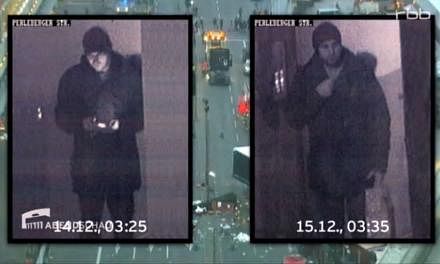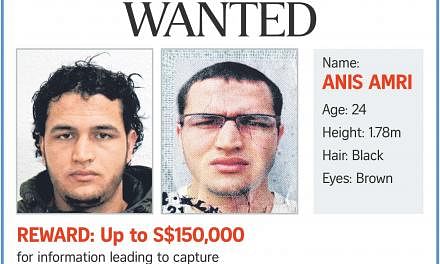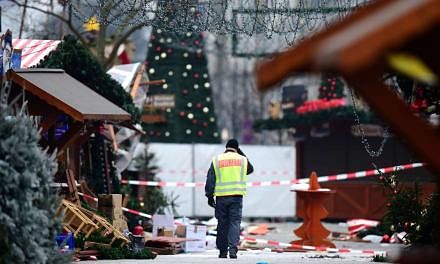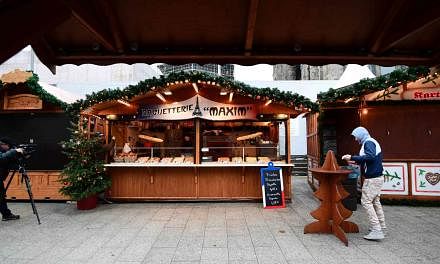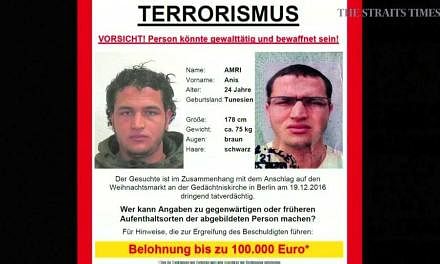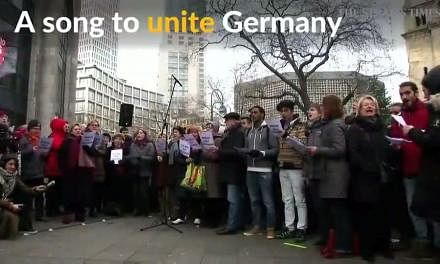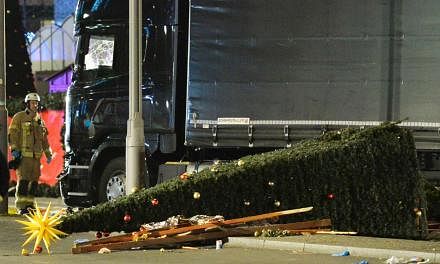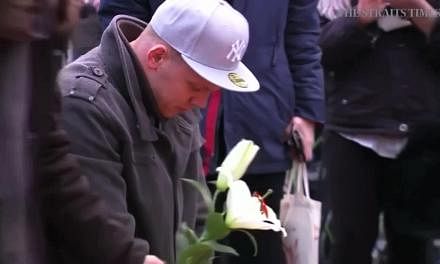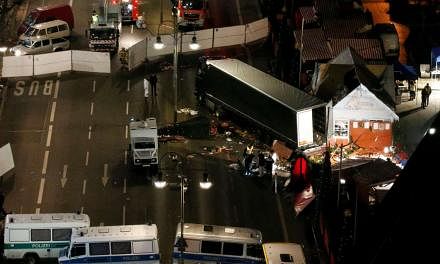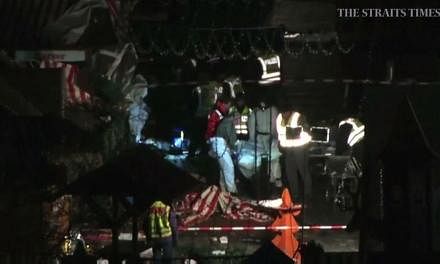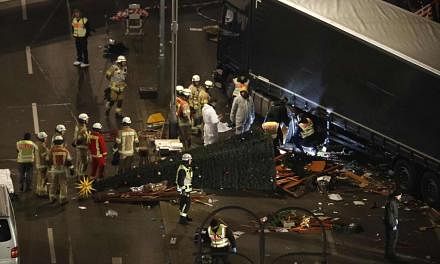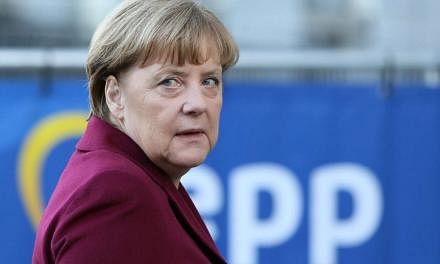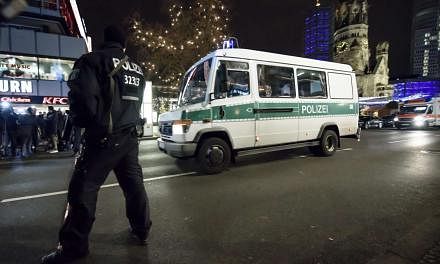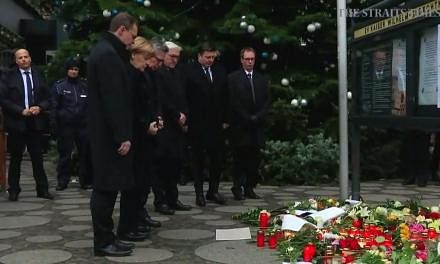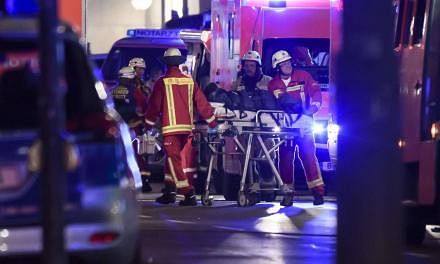BERLIN (NYTIMES) - The looming black semi with its shattered windshield was gone. The splintered boards and toppled Christmas tree had been cleared from the street and the square.
In their place, the cheery stalls selling mulled wine, crafts and trinkets had returned to the Christmas market on Breitscheidplatz in Berlin, which reopened on Thursday (Dec 22).
But if the holiday trappings could be easily restored, the holiday spirit that so infuses Germany this time of the year could not, not after Monday's attack that killed 12 and wounded dozens, at least not yet.
After that attack, the country's worst in decades, Berliners, like the French and the Belgians before them, seemed determined to continue to live life without fear. Shaken but undaunted, they trickled back to the city's beloved Christmas markets, most of which reopened on Wednesday afternoon.
Even as they did, the mood around the city was subdued, even tentative, and the crowds at the markets were rivaled by those at sprawling makeshift memorials, which were laden with flowers, candles and signs bearing messages of anguish and condolence.
"It hits us very close to home," said Ms Mileidis Andino, who moved to Germany 20 years ago from her native Cuba. "Christmas is such a big deal here, so important for families," she said. "It's the one time of the year when everyone comes together."
But since the attack, she said "people feel anxious".
"They feel sad," she said. "And what's starting to develop - it's not hatred - but it's a bit of this feeling, 'What have we done?'"
Those who ventured out were greeted by more police officers than usual and other added security measures, including concrete barriers around the market at Potsdamer Platz and other obstacles at the Brandenburg Gate, where Germany's largest open-air New Year's Eve celebration is expected to go forward as planned.
But as they do every year, ice skaters circled the Neptune Fountain at the Christmas market in front of the Rotes Rathaus, Berlin's city hall.
Ms Doreen Martens, a 47-year-old secretary, drank mulled wine and watched.
"There's a strange mood, a gloomy atmosphere," she said, as groups of police officers with automatic rifles made their way through the sparse clusters of people that formed in the market's opening hours on Wednesday. "The festive Christmas feeling is definitely gone."
Ms Irena Aksou, a Pole who moved to Berlin 44 years ago, agreed. "There's definitely a different feeling now," she said.
She works at a crepe and waffle stand at the Rotes Rathaus market and had to be there, she added, "but I wouldn't go to a Christmas market in my free time, not any more".
The news that German authorities were pursuing a Tunisian man who had entered the country as an asylum seeker seemed only to divide people further over Chancellor Angela Merkel's decision to allow roughly a million people to enter the country unchecked in 2015.
On Wednesday evening, about 130 far-right demonstrators held a vigil in front of Dr Merkel's chancellery, where they were met with about 800 counterprotesters from the Left Party, the police said on Thursday.
The protesters and others described the chancellor's decision as naive, a mistake and arrogant.
"We have to control better who's coming into the country and keep out the ones who have terroristic intent," said Ms Ina Redetzke, a teacher from Brandenburg who was drinking spiced punch at the Alexanderplatz market. "All the others are welcome as far as we're concerned."
Many members of Berlin's large immigrant community have tried to show solidarity with the victims since the attacks, sensitive to the possibility that anger would be redirected toward them.
"We want to serve as some kind of proof - that terrorism has no religion," said Ms Fifi Shukri, a 19-year-old Jordanian who stood at a makeshift vigil with a friend at the Kaiser Wilhelm Memorial Church, on the square where the attack took place.
On Thursday, bells at the church, whose war-damaged spire was left unrepaired after World War II, tolled 11 times, signaling the reopening of the market.
"I am a Muslim, but I love Christmas. ISIS, they are psychos, horrible people," Ms Shukri said, referring to the Islamic State in Iraq and Syria. "It has nothing to do with their religion."
Her friend Kamal Hamwi moved to Germany a year ago from Aleppo, Syria, where he grew up, and lives on the outskirts of Hamburg. He and Ms Shukri met in a German class, and both plan to apply to medical school.
His feelings about the attack? "It's a hard feeling, just between my heart and myself," he said. But most of his friends in Syria - now scattered in Arab nations and the United States - were Christians.
"There's no difference between religions," he said. "All humans are the same inside."
In the heavily Turkish and Arab section of the Kreuzberg district, residents were reluctant to discuss the attack, but those who did largely expressed a sense of grief and solidarity with the victims and their relatives.
"We hate the terror," said Mr Necat Aslan, who works at the Turkish bakery Simitdchi on Adalbertstrasse. "I was at the market an hour before the attack. I love Christmas markets. I go with my children. Of course, they have to stay open and keep going.
"I am sorry, though, that some Europeans will blame Islamic people," he said. "A fanatic is a fanatic."

